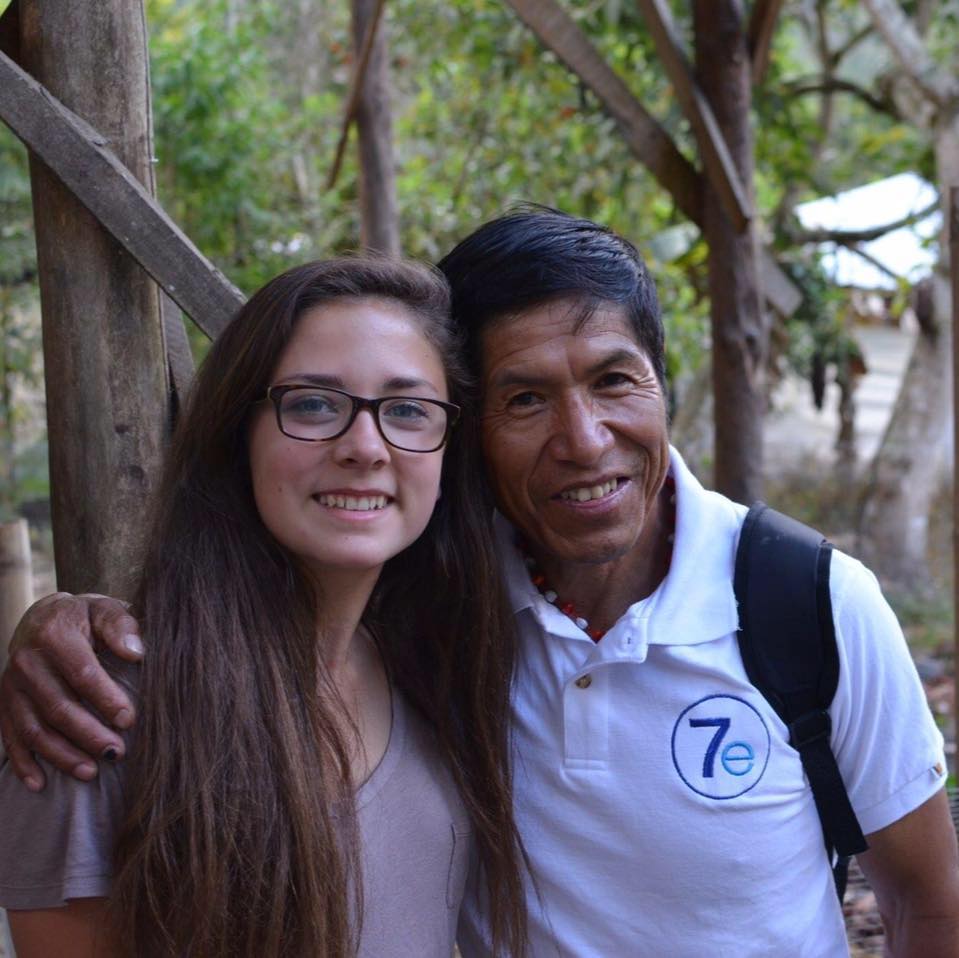
Name: Carly Anderson
Hometown: Ada, Michigan
Grade in school: College freshman, Tulane University
Area of study: Public health
Related GLA programs: Dominican Republic programs, Tanzania: Children's Education Adventure, Haiti: Global Health Initiative™
Claim to GLA fame: Starting her own legacy of service-learning by traveling with GLA four times; mentoring and organizing trips with nonprofit and GLA partner 7Elements; seving as chapter President of 7Elements at Tulane University
Carly Anderson is a force to be reckoned with. Within a few short summers, she graduated from being a first-time GLA student to a veteran traveler, to officially taking on a mentorship position in the Dominican Republic. Carly has already been to the DR, Tanzania, Peru and Haiti to work on development projects, currently serves as chapter President of 7Elements at Tulane University (a student organization that connects peers who are passionate about making the world a more sustainable and equitable place), and is self-organizing more trips to Haiti and Belize this year. She can also field even the most challenging questions about international development without batting an eyelash.
Did we mention that she's achieved all this before the end of her freshman year in college?
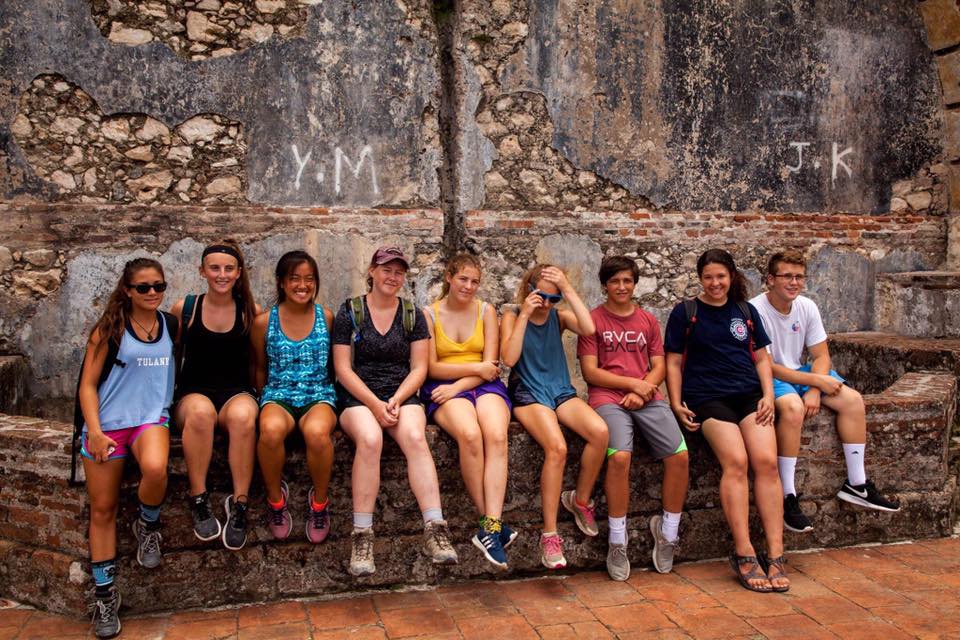
Carly organized a weeklong trip for some of her family members, close friends and peers to experience service-learning for the first time in Haiti.
We were fortunate enough to speak with Carly this week about how she does it all, what made her fall in love with the Dominican Republic and Haiti, and the qualities she's trying to cultivate as a rising leader. Check out her reflective answers below.
Hi Carly! You've accomplished so much since your first (of four!) trips with GLA. Can you give us the brief rundown and tell us about what you've been up to?
Hi! Absolutely. By my junior year of high school I already had four GLA trips under my belt: three in the Dominican Republic, and one in Tanzania. During my trips to the DR I was introduced to the nonprofit organization 7Elements, who are GLA's official partner in the DR and Haiti (and have been for the last nine years). I stayed in touch with the staff there to see what new opportunities might be available to me as my passion for international development grew.
Since then, I've gone on GLA's Spring Break trip in the Dominican Republic, this time as a peer mentor, not a student; traveled to Peru to work on a water filter project; traveled to Haiti for the first time to help with a medical brigade and became President of 7Elements at Tulane University, which was just granted "active" status. We're planning a trip to Belize this Spring Break and another trip to Haiti in the summer.
What did you enjoy most about peer mentoring in the Dominican Republic?
Being around the same age as the students, I felt fortunate to be able to provide mentorship on a peer-to-peer level. I think it was really nice for them to have that.
I loved seeing students have moments of surprise and understanding, and witness their preconceptions be challenged. After working just one day in the field, your eyes can really be opened to what "sustainable service" means. A lot of first-time GLA students come having only been exposed to service like handing food out at a homeless shelter. While every act of service comes from a place of compassion and good intention, those students realized after coming to the DR that a program giving handouts to the underprivileged provides only temporary aid; it doesn't tackle the root issue. I loved seeing the spark lit in those students to learn more and do more than just give temporary aid.
Being able to share the knowledge about sustainable development that I've gained over four trips plus independent research was a rewarding outcome of all my experience.
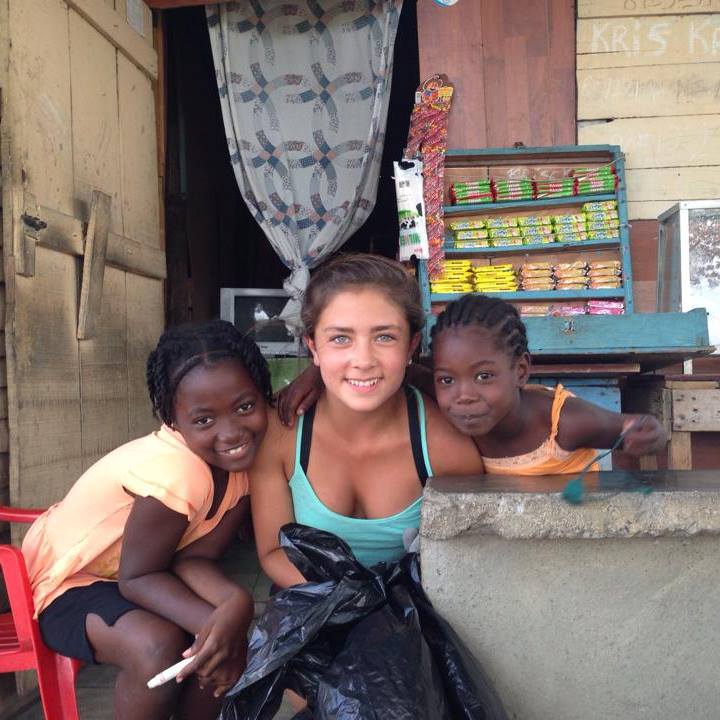
Carly traveled to Haiti to work with a medical brigade last summer.
See 2018 program dates & details for Haiti: Global Health Initiative™.
What was it like to travel to Haiti for the first time? Seeing the other side of the island that you'd already been to four times.
It is absolutely beautiful in Cap-Haïtien. You have to go there with an open mind: I see everything that's wrong with the country, yet I see its beauty as well. The people there, their resilience, what Haitians have going for them, the culture and the land itself. It's all really beautiful. The different projects we're doing are extremely impactful and also true learning experiences.
You're a public health major now. Was your work in Haiti related to global health or medical aid?
Yes, I got to help run medical brigades and shadow a doctor. I literally sat next to the doctor and got to actively participate in every patient conversation from diagnosis to prescription. Seeing a pop-up medical clinic, getting to know the patients and observing firsthand how the staff operates in a developing country is something I really appreciated as a public health major. But it's not just for aspiring health professionals; it's eye-opening insight for anyone into basic human needs and how we can better meet them.
I want to be a doctor in the future, so getting some fieldwork experience, as different as it might look at a US practice, was amazing. When would I get to sit next to a doctor in the United States as a college freshman and experience all of that? Never, probably.
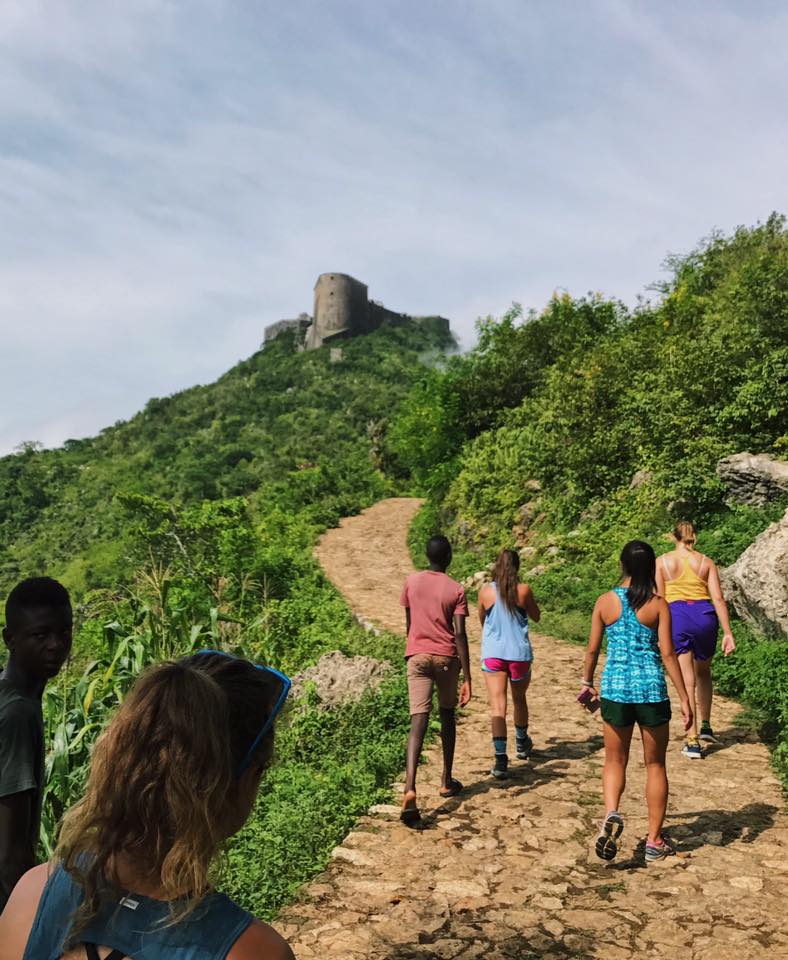
Carly and fellow students hike toward the Citadelle Laferrière, a historic fortress near Cap-Haïtien, Haiti. See 2018 program dates & details for Haiti: Global Health Initiative™.
What about the language barrier with French and Creole being the primary languages?
The language barrier was there, but it was manageable. I was always with program directors, medical brigade staff and the doctor, who all knew Creole, French and Spanish. I guess it's common there to be trilingual! I have pretty good Spanish, and was able to get by with a combination of that and hand motions. Peers who had a high school level of French found that sufficient for basic communication.
Did you feel safe in Haiti?
I never felt unsafe. While Haiti's level of poverty can be a bit of a shock, it's not a dangerous or violent or crime-ridden place. It's simply that the surroundings may be a step or so out of your comfort zone. The lodge where Home Base is located is gated, guarded by security and by guard dogs. Accommodations are fine, and the food I had was no different than Dominican food: rice, beans, chicken, lettuce, tomatoes and plantains. I never got sick and my peers didn't get sick either. You also don't have to deal with being taken advantage of as a tourist because tourism isn't a big industry here, especially in Cap-Haïtien. I always felt 100% safe.
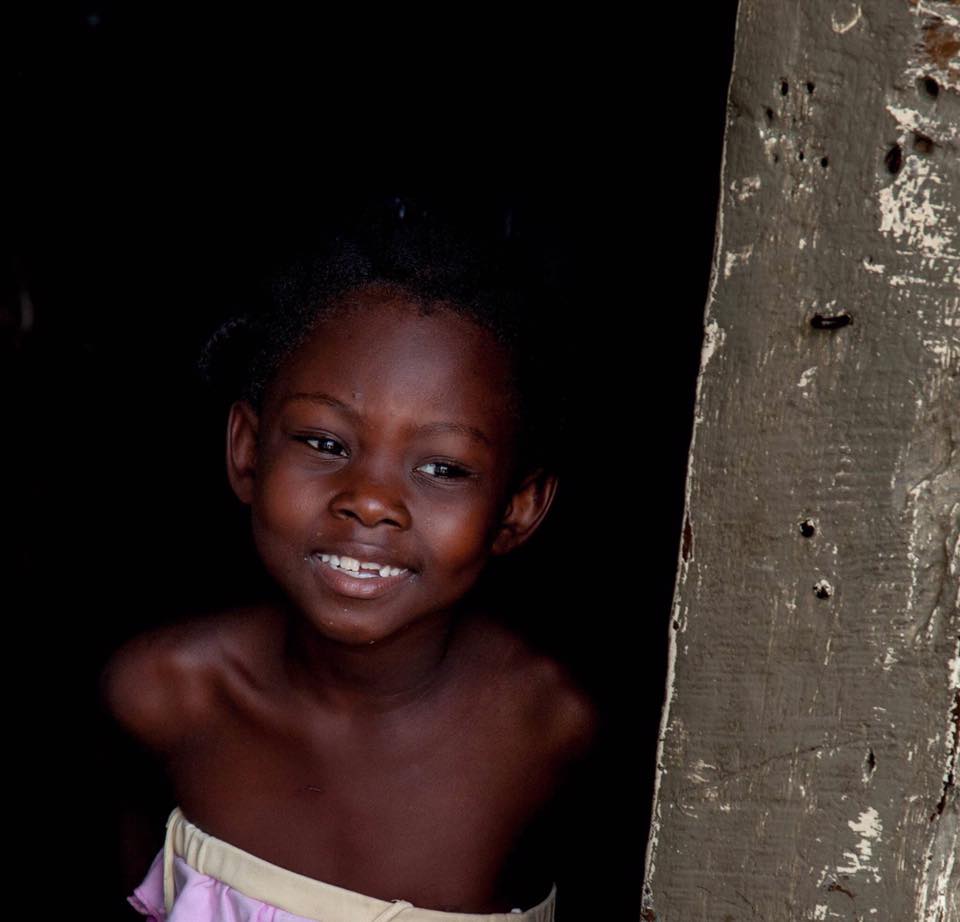
One of Carly's beautiful shots of the resilient people of Haiti.
As you know, this week we're focusing on the theme "leadership with heart," as a play on the upcoming Valentine's Day. Want to give a shout-out to any leaders, mentors or role models who have exhibited compassionate leadership that you'd like to emulate?
Yes, absolutely.
Cameron Addison directed my first program in the Dominican Republic, and he's the reason I came back. He introduced different ways of thinking that I had never considered before; just putting your passion first and always showing up with the willingness to do more. To go beyond. I started trying to emulate everything he did—if he was still carrying buckets of cement up the hill at the end of the day, I wouldn't stop either. He also remember my name from trip to trip, even though GLA's Dominican Republic programs see hundreds of students each summer. He taught me that a good teacher really cares about his or her students. That helped me believe that making an effort to stay in touch with my students, once I became a mentor, would be worth it too.
Liv Evans is another role model I'd like to shout out. Liv attends Tulane as well, and actually swayed my college decision to come study public health here. She worked for 7Elements, helped get our university chapter off the ground and is now studying international development and public health. She simply taught me that leading by example and showing conviction in your beliefs and goals can influence others around you so much. She's handed off leadership of 7Elements at Tulane University to me now, and I'm trying to do her proud. All of Tulane's international developent and public health department inspires me.
[Editor's note: You can read an interview with Liv Evans on the 7Elements website here.]
What about your own leadership? Now that you're president of your own student organization, you're leading trips and more... how do you stay positive and hopeful rather than overwhelmed by how much work there is to do?
Funny story—Cameron actually started one of my early trips announcing to students, "People are starving, the climate's destroyed." It was partially Cameron's typical sarcastic, dark humor, but he also did want us to get used to the fact that we would feel overwhelmed. He wanted to prepare us for the thought of, "I'm so little; I can't do anything," and that feeling of being too petrified to take a first step. The mantra I've adopted, that I like to repeat to myself to combat those thoughts is, "One person cannot change the world. One person can change another person's world." We can all do one little thing at a time. We can build one home that directly impacts one family, who might be moved to impact another family, or use that space to gather their community. To me, focusing on my small piece of the puzzle is motivating. To see how little I need to do.
I also try to remember individual moments with the local people when I'm traveling. Those small achievements of breaking through a cultural barrier often turn out to be profound, even if it's just laughter and gesticulation in the moment.
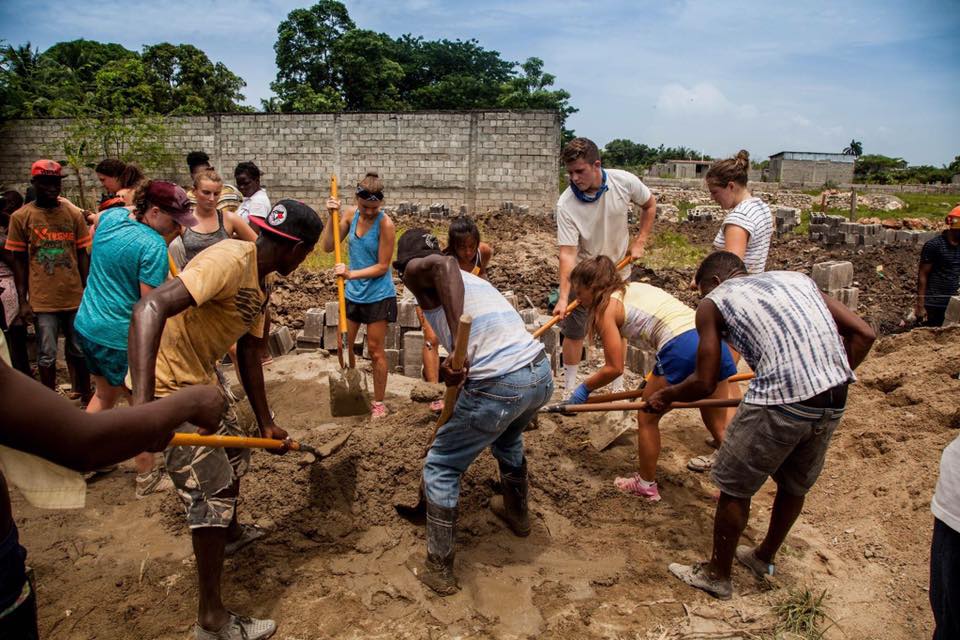
Carly and other students work on breaking ground for a medical center that will serve residents of rural communities near Cap-Haïtien, Haiti, a project they'll continue this summer.
Do you have plans for growing 7Elements at Tulane? What impact would you like to see?
The organization was just granted "active" status at the University, so we're in our first active year right now, and we're still small. We're about eleven people strong, which is enough to finish a water filtration project, or help operate a medical brigade or build a bottle home. Tulane also has an extremely dedicated community in international development and public health that we can feed off of, with students and faculty that are just brilliant. It's the reason why I came here. So there's definitely room to grow.
The impact I'm hoping for is that the other students simply understand the 7Elements model and apply it to their understanding of the world, and any impact projects they want to take on.
[Editor's note: The 7Elements method of guiding development interventions and projects is based on a model that breaks the situation down into 7 Elements of Human Security, as defined by the United Nations: Economic security, Environmental Security, Political Security, Food Security, Health Security, Community Security and Individual/Personal Security. This holistic model ensures that it is sustainable and beneficial to the community in the long-term.]
How has that model helped you work through challenges of development in a country like Haiti?
The most important lesson from knowing the human security model is simply the mindset shift. All of a sudden you look at countries like Haiti as not "people who need to be saved," but communities that are seeking reciprocal partnership. There's a big misconception that Haitians can't manage without foreign assistance, because of a certain media angle on the natural disasters they've experienced in the past, which then ushered in large aid groups, leading to handouts. That perpetuated a cycle of dependency and the world looking down upon this population.
We know that didn't serve the Haitians well: There are still more NGOs present in Haiti than the country's own citizens, with little progress to show for all of those years of foreign assistance. Using the human security model prevents that inefficiency and wrongful bias, and allows us to start with step 1: What do the people need? How can we set something up that we know they can use and grow and take ownership of in the long term?
On the first day of a project I worked on in Haiti, the 7Elements team gave money to a local group to buy wood for construction. When we came back the next day to break ground, they didn't bring the wood. They had pocketed the money. This wasn't because they were thieves; it was because they were so used to foreign aid groups coming with handouts and not following through with what was actually needed—partnership—that they assumed the same thing would happen again. When we actually showed up and demonstrated that we needed their participation to make this project happen, they were surprised, happy and collaborative.
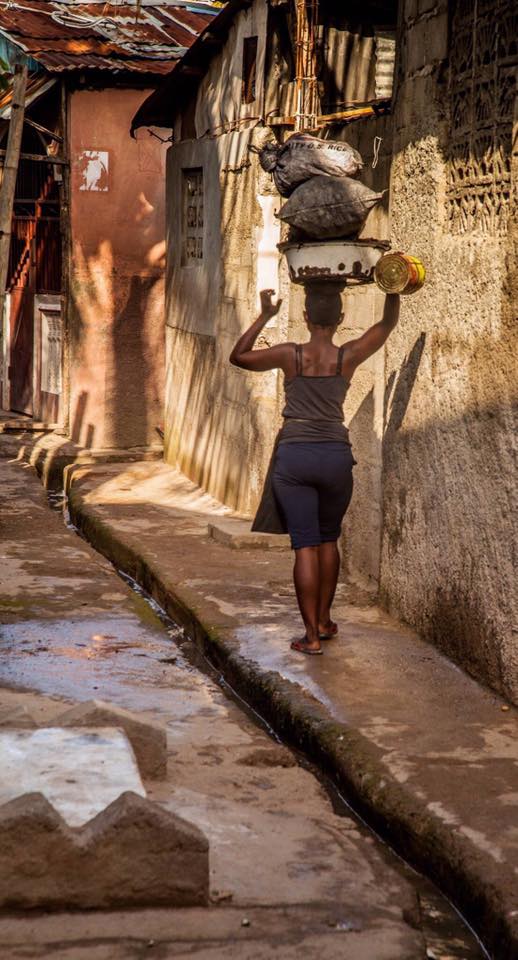
Another shot by Carly of Haiti's streets. "I see everything that's wrong with the country, yet I see its beauty as well," she says.
Tell us one favorite memory from Haiti.
I was shadowing a doctor at the medical brigade and we met this woman who was 20 years old. We thought she was obese, and were going to give her heart and diabetic medication. Then she revealed that she hadn't had her cycle in 8 months. It dawned on us that she was actually 8 months pregnant, and she'd gone on that long without realizing it. I was present for the moment that we told her she had a healthy pregnancy, and I got to ride with her to another clinic where she could go for monitoring for the rest of the pregnancy and consulted on a safe birth. It was a combination of shock and delight in life's miracles. To play a small role in her having a healthy delivery—and to have prevented the complications that would have come with a home birth—I'm so glad the clinic was set up that day and she decided to come.
Do you have any recommended reading or documentaries that you'd like to share with our readers?
The documentary I can think of is Poverty, Inc., which is on Netflix. It's eye-opening.
What advice do you have for families and students who are considering their first service-learning trip this summer?
For parents, you just have to trust the process. Your student will come back different than when they left you, and that's not a bad thing. I understand that making the first leap is difficult, but for your student to miss out on a life-changing experience, those are disproportionate risks. Really, I should just say to talk to my mom [laughs]. After I'd gone on three trips, she knew she had nothing to worry about anymore. I even brought my younger brother to Haiti with me last year. It was rewarding to see him find his own niche: He's passionate about climate change and the environment now, and is picking his next destination.
For students who might be traveling for the first time, being in that airport alone, flying over that ocean to that new country—you realize it's a big world. That initial flight can be scary, but save your doubts: The experience changes when you meet the other students. You're not alone; you'll meet your new family soon. Once you're in the country, there will be at least one other person you'll become best friends with, if not twenty.
What's your 2018 mantra?
I don't really have a mantra or resolution, besides staying positive. Trying to make as much of an impact as I can. I have a lot of resources now; I'm pretty privileged. I won't let that slip by while I'm at Tulane.
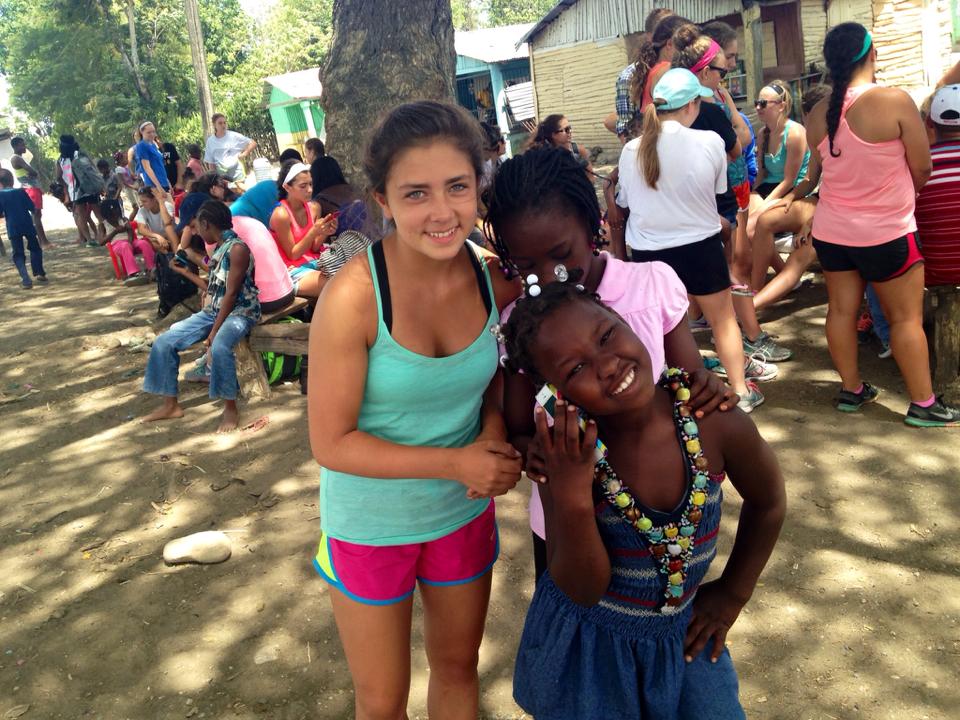
Carly one one of her early GLA trips.
Thank you, Carly! Best of luck for your brilliant future and thank you for keeping in touch with us on your leadership journey!

